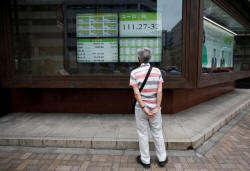|
Global stocks and
sterling bounce after Brexit bashing
 Send a link to a friend
Send a link to a friend
 [July 07, 2016]
By Marc Jones [July 07, 2016]
By Marc Jones
LONDON (Reuters) - Share markets
climbed on Thursday as upbeat U.S. economic data took some of the
sting out of the Brexit scare, while the Australian dollar dipped as
the country's triple A credit rating came under threat.
The European market started firmer with the FTSE up 1.7 percent, the
CAC in Paris 1.9 percent higher and Germany's DAX rising 1.3
percent. U.S. S&P futures pointed to a 0.2 percent bounce.
In the currency market, Brexit-battered sterling also steadied at
$1.2980, while the Aussie dollar fell as low as $0.7467 after
Standard & Poor's cut the country's rating outlook to negative from
stable, citing a need for fiscal repair.
The agency had warned it may act after inconclusive elections over
the weekend suggested the next government would have a hard time
getting reforms through to law.
However, investors are less sensitive to ratings these days given so
many countries were downgraded in the wake of the global financial
crisis and the Aussie soon steadied at $0.7511.
Likewise, Australian bond futures barely budged as 10-year
yields of 1.88 percent make the debt highly attractive compared to
the negative yields of some of its peers.
Italy led a move higher in southern European bond yields meanwhile
as the rising popularity of the anti-establishment 5-Star Movement
(M5S) and concerns about a banking sector saddled with bad debts
rattled investors.

Polls showed this week that the M5S -- which has called for a
referendum on euro zone membership and triumphed in local elections
last month -- is now Italy's most popular party, ahead of Prime
Minister Matteo Renzi's Democrats.
Italian 10-year bond yields rose 3 basis points to 1.20 percent
IT10YT=TWEB, pulling away from the German benchmark which was flat
at minus 0.17 percent
"It all circles around Renzi being able to win this referendum, with
these legacy problems in the banks also coming back to haunt Italy,"
Commerzbank strategist David Schnautz said.
RESILIENT
Earlier in Asia, the mood had been one of relief that Brexit fears
had faded for the moment. MSCI's broadest index of Asia-Pacific
shares outside Japan rose 0.8 percent.
Japanese shares were restrained by a strong yen and the Nikkei
slipped 0.9 percent.
Still, it was notable that while bond markets have been signaling
recession, equities had stayed fairly resilient.
"The most optimistic interpretation is that markets believe a
limited regional shock is going to result in a significantly easier
stance for global monetary policy," David Hensley, an economist at
JPMorgan, said in a note.
"At ground zero, the Bank of England has indicated it may soon cut
rates. There is widespread speculation the BOJ and ECB will ease, a
view we share."
More importantly, JPMorgan believes the Bank of England will revive
its quantitative easing process while the British government
reverses course on austerity and loosens fiscal policy, which could
be a green light to fiscal expansion globally.
[to top of second column] |

A man looks at an electronic board showing the Japanese yen's
exchange rate against Euro outside a brokerage in Tokyo, Japan, July
6, 2016. REUTERS/Issei Kato

NO FED HIKE UNTIL 2019?
Sentiment got a welcome lift from a survey showing activity in the giant U.S.
service sector hit a seven-month high in June as new orders surged and companies
hired more.
That helped the Dow rise 0.44 percent, while the S&P 500 gained 0.54 percent and
the Nasdaq 0.75 percent.
Minutes from the U.S. Federal Reserve's June policy meeting confirmed what was
already suspected - that officials were concerned ahead of the Brexit vote,
which subsequently erased $3 trillion from global equities over two days.
The British pound remained vulnerable at $1.2975, having slid almost 3 percent
in the previous two sessions to carve out a 31-year trough of $1.2898.
The safe-haven yen was well bid at 100.73 per U.S. dollar, while the euro
held steady at $1.1090.
Markets have assumed the uncertainty over Brexit, and the resulting strength in
the U.S. dollar, has made it very unlikely the Fed will be able to hike rates
again this year.
Fed fund futures for December imply a rate of 38.5 basis points, almost exactly
where the effective rate is now. Remarkably, the market is not fully priced for
a hike until the start of 2019.
Treasuries have in turn enjoyed an historic rally that has taken yields to
record lows right out to 30 years. The benchmark 10-year note was paying just
1.37 percent, some way below the rate of U.S. inflation.
Indeed, analysts estimate over $10 trillion of government debt around the world
offer only negative yields, a nightmare for fund managers and insurance
companies who have committed to future pension payments at positive rates.

In commodity markets, oil prices recouped some lost ground on the better U.S.
data and expectations for a sharp drop in crude stockpiles.
NYMEX crude futures were quoted 25 cents firmer at $47.68 a barrel, while
Brent added 23 cents to $49.03.
(Additional reporting by Wayne Cole in Sydney and John Geddie in London)
[© 2016 Thomson Reuters. All rights
reserved.] Copyright 2016 Reuters. All rights reserved. This material may not be published,
broadcast, rewritten or redistributed. |